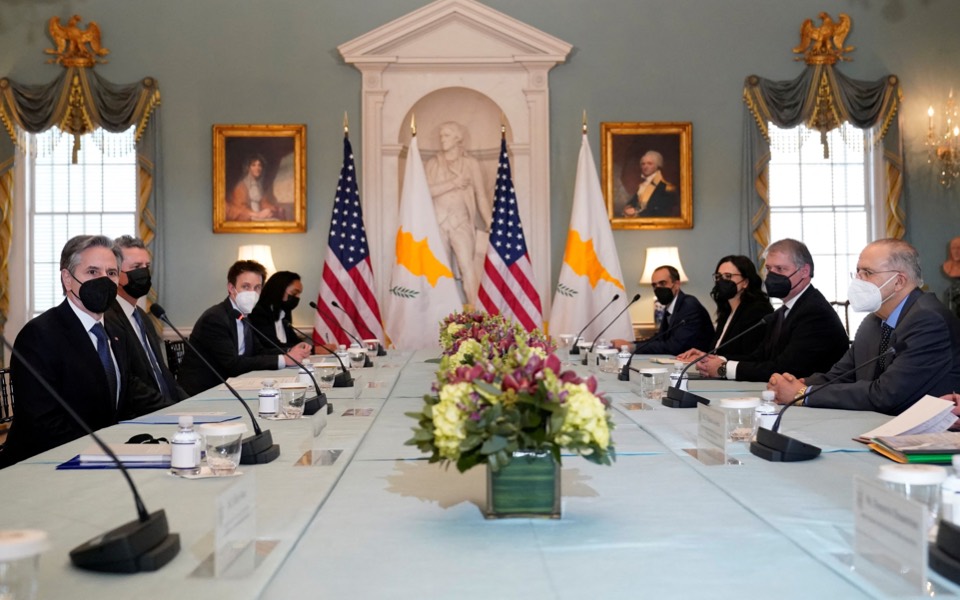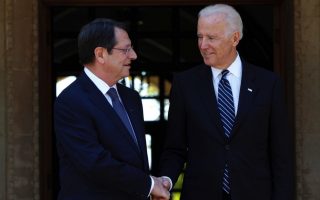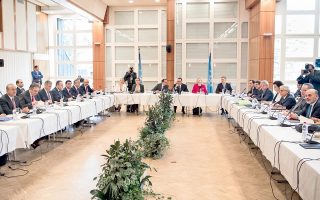Dangerous double standards

Advocating for justice for Cyprus in Washington, DC requires levels of commitment and stamina that most people do not appreciate. Listening to administration after administration loudly declare commitments to human rights and international law while reducing such commitments to whispers with regard to Cyprus is maddening. Trying to decipher why the US State Department uses the word “occupation” around the world while studiously avoiding it when talking about Cyprus makes us feel for the scholars who were trying to understand hieroglyphics prior to the discovery of the Rosetta Stone. Tragically, we often feel that State Department and National Security officials speak to us (and to the Republic of Cyprus) as if they are engaged in their own version of the Melian Dialogue: “The strong do what they will, the weak suffer what they must.”
This frustration reached a new level this month. On February 1, Cypriot Foreign Minister Ioannis Kasoulides met with US Secretary of State Antony Blinken. They discussed bilateral relations, regional cooperation (including fixing the mess caused by the famous EastMed “non-paper”), and new confidence building measures on Cyprus. The day before, US Ambassador Linda Thomas-Greenfield admonished the Russians at the United Nations Security Council with this statement: “Imagine how uncomfortable you would be if you had 100,000 troops sitting on your border.”
Madam Ambassador, Hellenes can do better than “imagine.” Cyprus is occupied by 40,000 Turkish troops and we can’t recall your admonitions at the Security Council regarding those troops even as the Republic of Cyprus points out movements that they make in the buffer zone in occupied Cyprus, movements that threaten the tenuous stability on the island. In the Aegean, Turkey maintains an invasion force just miles from inhabited Greek islands, regularly violates Greek airspace (with American jets to boot) and has pre-declared war in the event that Greece exercises its rights under the United Nations Convention on the Law of the Sea. Given your proclamations on Ukraine, the US response to the formal challenge to Greece’s sovereignty by Turkey’s ambassador to the United Nations (“the sovereignty of Greek islands is not in question”) should have included a criticism of Turkey’s force posture and warmongering vis-a-vis Greece.
President Joe Biden declared that the present crisis “is about more than just Russia and Ukraine.” By the same token, Turkey’s belligerence in the Eastern Mediterranean and the Aegean is about more than Greco-Turkish relations. Ankara undermines international law as well as Eastern Mediterranean cooperation and integration. The only NATO member that currently faces an active threat of war is Greece, and that threat comes from a NATO “ally” – Turkey. For all the hand-wringing going on over what the consequences would be for NATO if Russia invaded Ukraine, there is too little consideration of how easily the Alliance could be obliterated from within because of Turkey’s aggression toward Greece.
If no one in the administration is considering what Russia makes of Turkey’s free passes when it comes to invasion, occupation and threatening war, then the president’s National Security team isn’t doing its job. In a 2014 New Republic piece, David Klion argued that the best historical analogy for Russia’s invasion of Crimea was not Hitler’s “incursions into Czechoslovakia and Poland, ostensibly to liberate German-speakers in those countries,” but Turkey’s 1974 invasion of Cyprus. Klion conceded that “even this analogy may be too hard on Putin.” The State Department can pretend that its failure to hold Turkey accountable for 47+ years of occupying Cyprus has nothing to do with Russia’s behavior, but it is in fact merely pretending.
Russia would surely love nothing better than the world tolerating the status quo in Donbas and Crimea while it deepens its colonialization of these regions. That is why Moscow must smile at tweets by the US ambassador to the Republic of Cyprus declaring how “pleased” she was that she and Deputy Assistant Secretary of State Erika Olson met with the intransigent, nationalist Turkish-Cypriot leader Ersin Tatar, who constantly thumbs his nose at overall US policy on the reunification of Cyprus and blatantly violated American warnings on Varosha. The Russians must have cracked jokes about a future American ambassador to Ukraine visiting the “leader” of the Donbas region with a deputy assistant secretary of state and having a “good discussion and an important and positive exchange of views.”
During his 2014 visit to Cyprus, then Vice President Biden declared: “The United States – I want to be clear about this – recognizes only one legitimate government of the Republic of Cyprus, and my visit and meetings throughout the island will not change that. It is my personal position. It’s the position of the United States of America, and it’s the position of the entire world – save one country.” The actions of too many US ambassadors to Cyprus and lower-level State Department officials have allowed Turkey and Turkish-Cypriot officials to doubt that statement.
Maybe it is time for the Greek-American community, the advocacy organizations they are allied with, and the US Congress to doubt administration declarations that it is “clear-eyed” with regard to Turkey. The process for choosing a new US ambassador to the Republic of Cyprus will be fully under way soon, and the Senate Foreign Relations Committee should ensure that the nominee understands that undermining the Republic of Cyprus or encouraging Turkish-Cypriot intransigence is unacceptable. The way the administration spends money for purported bicommunal activities, and the level of engagement by State Department officials with Turkish Cypriots that openly defy US policy should also come under strict Congressional scrutiny.
It is time for the US to start treating the Eastern Mediterranean and Aegean as bigger than a Greco-Turkish dispute. Continuing to get this wrong only enables Russia in Ukraine and China in the South China Sea. Hopefully we can soon hear these words from Ambassador Linda Thomas-Greenfield: “Imagine 40,000 troops occupying your country and keeping you from going home for 47 years.”
Endy Zemenides is executive director at the Hellenic American Leadership Council.





